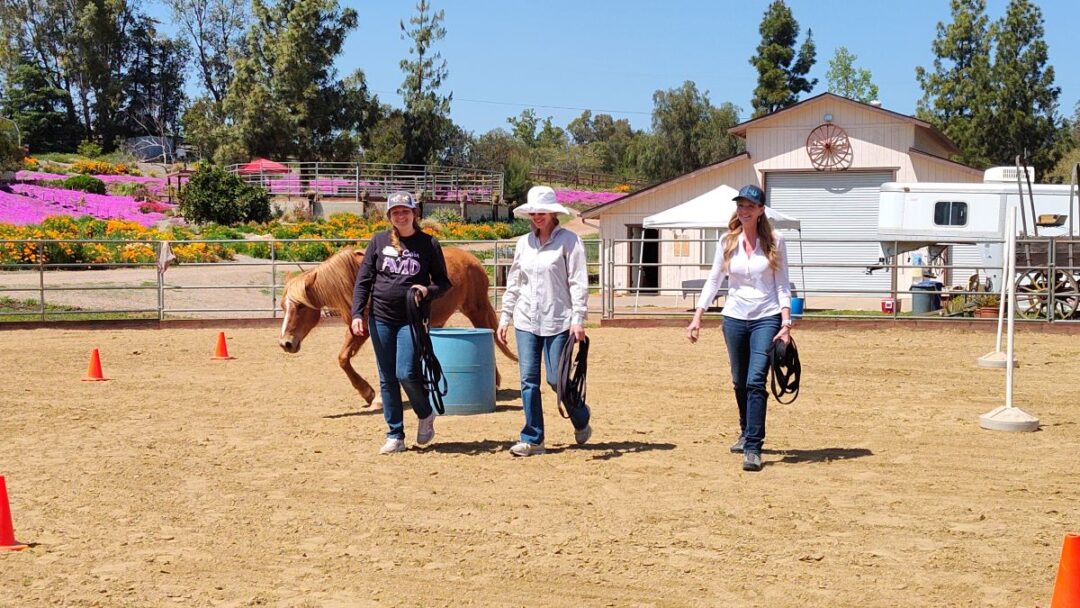
It was a very hot afternoon in Houston, Texas, and the executive team I was working with was all gathered around a small horse named Finley. The team had been challenging for me to facilitate over the last two days. Individually, they all said they had a problem with their leader, and yet when they were with her in person, they seemed to be so connected with her. They were attentive, engaged, and friendly. How would the leader ever understand that there was a problem, I wondered.
I had noticed that their leader did have some challenging behaviors. She often appeared to be doing something else rather than listening to the group when they spoke, frequently lost in her phone or looking off somewhere else. However, I also noticed that even though she looked distracted, she seemed to track everything that was being said and responded thoughtfully to the points being made. I couldn’t quite understand what was happening.
This particular team of highly intelligent, high performers tended to talk a lot, and I found myself frequently intervening to ensure they slowed down enough so that each voice was heard. The task I had asked them to perform with the horse, I knew, had the potential to bring conflict out in the open, which I hoped would be a good thing. At that moment, they stood in the middle of the arena in the hot sun, stalled in their task as they worked verbally toward a team solution. Finley stood patiently, and a few team members had gathered around his head, absent-mindedly running their hands through his mane. They’re regulating their emotions, I thought to myself. I wondered if we should call a timeout, move to the shade, and get some water.
I waited a few more moments. Then, finally, a magical thing happened…one of the team members, the one who was having the most difficulty with his leader, said something important. “I don’t want to follow you because I don’t think you care about me.” The assistant jumped in to defend the leader. “Wait!” I said. “Everyone, stop for just a moment.” I turned to the leader. “What did you just hear?”
She looked at the ground as she answered. “He doesn’t think I care, but I don’t understand that. I listen to everything he says, and I always value his opinion.”
The assistant again jumped in. “She does care about you! She values your contributions and respects your opinions. I hear it all the time.”
There was a jumble of speakers then, and Finley shifted his weight away from the group slightly.
“How about if we let her respond to this herself?” I asked. “What’s happening for you right now?” I asked their leader. Finley’s head swung in toward the leader’s chest, and he shifted his hind legs a bit to pivot around and get his head closer to her. She began to cry, and everyone was silent.
When she started talking, she talked about her son and a recent autism diagnosis. The team leaned in closer now, too. They really cared about her. Then she said, “In all these years, I never knew he had a problem, and I never noticed there was anything different about him because he’s exactly the same as I am.”
The statement rippled through the group. Soon, there were tears in everyone’s eyes. Finley lifted his head to nuzzle the leader’s neck and face. They all stood and cried together in a rare moment of quiet. Then they all burst into speech again, words of encouragement and understanding, and from the one who thought she didn’t care, “Oh, so that’s why you don’t look at me. It’s not because you don’t care.”
The leader looked shocked. “Is that what’s been happening? You think I don’t care about you because I don’t look at you?”
“Yes.”
A few others added that they had often felt the same way.
“I’m so sorry! I had no idea you felt that way. I value every single person here. That’s why I have you on the team.”
“How would it feel to move to the shade and get some water?” I asked, so grateful that I’d hung in there just a few more moments earlier, but now sensing they could take it from here.
The group thanked and hugged Finley, then walked toward the shade, huddled together, excited and talking over each other in what felt like a huge sigh of relief. They finally understood one another. Finley dropped his head and started looking for something to graze on, his job complete.
Working with teams, with or without horses, is a rewarding challenge. If you’re a coach who wants to work with teams and groups, we’re starting a training in August, during which you can acquire your Advanced Certification in Team Coaching from the ICF. Our team of highly experienced coaches would love to have you join us. All coaches are welcome to participate in this training, regardless of whether they are an Equus Coaches. Click here for more details.